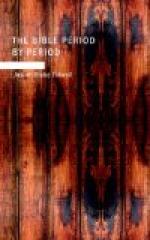God showed his mercy to Cain whom he sent away from the place of worship at the east of the garden by putting upon him the divine mark so that no one should destroy him. He also allowed him to prosper and it was through his descendants that civilization began to show itself.
Cain and Seth-Two Races. Another son was born to Adam named Seth. Probably others have been born since the death of Abel but none of a like spirit to Abel and hence none worthy to become the head of a spiritual branch of mankind. Cain’s descendants applied themselves to the arts and to manufactures, to the building of cities and the making those things that furnish earthly comfort, while the descendants of Seth, were selected to be the instruments of religious uplift and to have communion with Jehovah. Through inter-marriage with the descendants of Cain, however, the generation of Seth was corrupted. This led to a period of great wickedness and the destruction of the people by the flood.
The great age of those who lived in this period may have been a provision of nature for the promotion of a rapid increase of the race and for the advancement of knowledge. The revelation of God to them could thereby be the better preserved. Then, too, the body of man was not originally subject to death and when it became so because of his sin, the process of decay may have been less rapid. And, besides, the effect of hereditary disease had not begun to effect and weaken the race.
The Great Wickedness. As indicated above, this Wickedness seemed to arise from the intermarriage of the descendants of Seth and those of Cain. The descendants of Seth were called “the song of God,” because they were the religious seed. When they looked upon the beautiful daughters of Cain (called the daughters of man because they represented the irreligious portion of the race), they married them and thereby brought the whole race into such corruption that “every imagination of the thought of his heart was only evil continually” (Gen. 6:5). God therefore declared “My Spirit shall not always strive with man” and set the limit when he should quit thus striving with him at one-hundred and twenty years (Gen. 6:3). After that God proposed to destroy the whole wicked race from off the face of the earth (Gen. 6:7).
Noah God’s Chosen Man. The narrative tells us (Gen. 6:8) that “Noah found favor in the eyes of Jehovah.” This was no doubt because his character and acts were acceptable to Him. He was the tenth and last in the Sethic line. He was the son of Lamech (Gen. 5:28), a godly man, who had felt the weight of burden because of the curse which God had pronounced upon the ground because of Adam’s sin. He was called Noah by his father, because he said the child would be a source of comfort concerning their toil growing out of that curse (Gen. 5:39). He was a just and perfect man and walked with God (Gen. 6:9; 7:1). Compare also I Peter 3:20 and Heb. 11:7. He is also called a preacher of righteousness (II Peter 2:5) and it is probable that, during the one-hundred and twenty years that were likely employed in building the ark, he preached to his generation and tried to lead them to repentance. He was, however, unable to influence any save his own family. The saving of his own family was, however, a splendid monument of his life.




